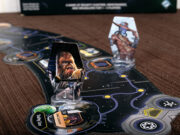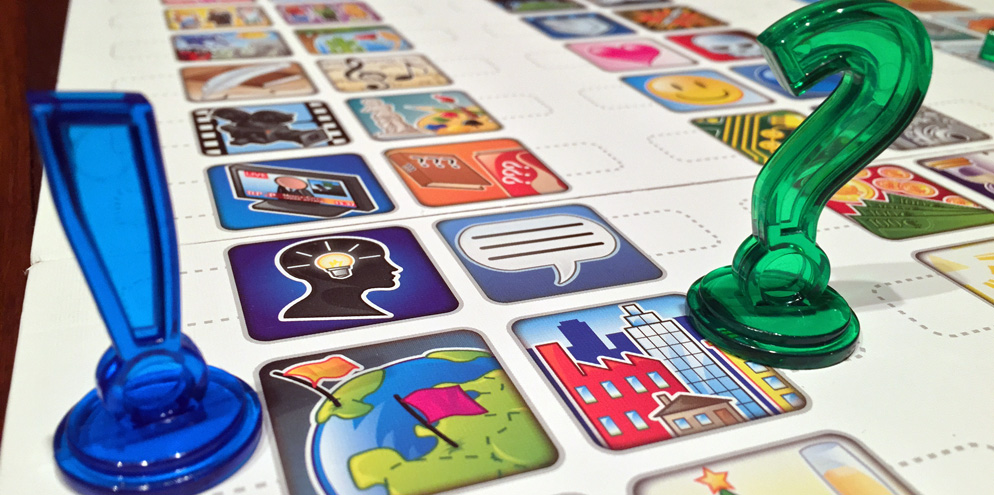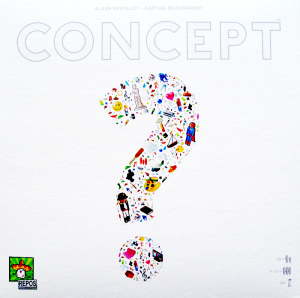 So what makes a good party game? Your answer will probably depend on who you ask as everyone has their own preferences and requirements. This past year, Love Letter won the Golden Geek Award for best party game. While Love Letter is a great micro game, there is no way I’d consider this 4 player game a party game (unless your parties are really bad).
So what makes a good party game? Your answer will probably depend on who you ask as everyone has their own preferences and requirements. This past year, Love Letter won the Golden Geek Award for best party game. While Love Letter is a great micro game, there is no way I’d consider this 4 player game a party game (unless your parties are really bad).
For me, a party game needs to be really easy to learn, highly interactive, and be able to accommodate a large group of players. In general, if it can’t meet all of those requirements, then it’s probably not a party game. But that’s just my take. Today, we are going to set our eyes up on Concept, which was nominated for the 2014 Spiel Des Jahres award. Published by Asmodee Games, Concept has been labeled as “Charades: The Board Game”. Should that description make you run away screaming? Let’s find out.
Concept is a party game for 4-12 players that has a play time that’s highly variable, but about 40 minutes if you’re Asmodee. Concept plays best with any amount of players.
Game Overview:
In Concept, the goal is for players to guess a word through a series of associated icons. One player chooses a word and they must get the other players to guess it. That player can’t use any verbal clues or gestures; instead they must rely on a game board full of icons. By placing clue tokens around the board, they will try and lead the players to the correct answer. Guess an answer correctly and you both win victory points (technically, more on that later).
Game Components:
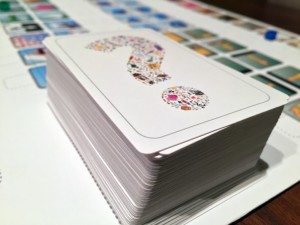
For a party game, I was pleasantly surprised with the components in Concept. I generally don’t have high expectations when it comes to party games. Everything included in the box felt high quality. The main attraction here is the game board, which features row after row of illustrated icon art. The designers did a good job of making sure the amount of icons were fairly diverse and give you a wide range of what you might want to use during the game.
To enable guessing, there are a number of plastic question marks and exclamation points in 5 different colors, along with a number of matching color plastic cubes. To keep track of a player’s score, there are a pile of “light bulb” tokens.
Finally, the game comes with a deck of word cards. Each card has 3 different sections (easy, medium and hard), with three words per section.
How to Play:
You’ve already heard the majority of rules, but here are the official rules. Two players sitting next to each other form a team. That team draws a concept card and chooses a word for the rest of the players to guess.
To get the other players to guess, the team must use the board and plastic tokens to get their “concept” across. They start with the big green question mark token. Wherever this is placed illustrates their overall concept. They can further clarify this by using the matching plastic cubes or the different colored “sub concept” exclamation points and cubes.
For example:
Say the word is Eiffel Tower. You might place your green question mark on the “Building” icon of the board to illustrate that your players are trying to guess a building. Then you can place a matching green cube on the iron girder icon on the game board, so show it’s made out of metal. So now we have that it’s a metal building, but that’s probably not enough. So grab your blue exclamation mark token and let’s get a sub-concept out there. You place it on the world/location square (specifically on the flag icon illustrated there), and then take 3 matching blue cubes and place them on the color squares red, white, and blue. Putting it all together we have:
A building, made of iron, located in a country with red, white, and blue flag = Eiffel Tower.
Make sense?
The person that guesses the correct answer gains 2 victory points and the team members each score 1 victory point. Now play rotates to the next pair clockwise and they get their chance. After about 12 rounds, the game ends and the player with the most VP wins.
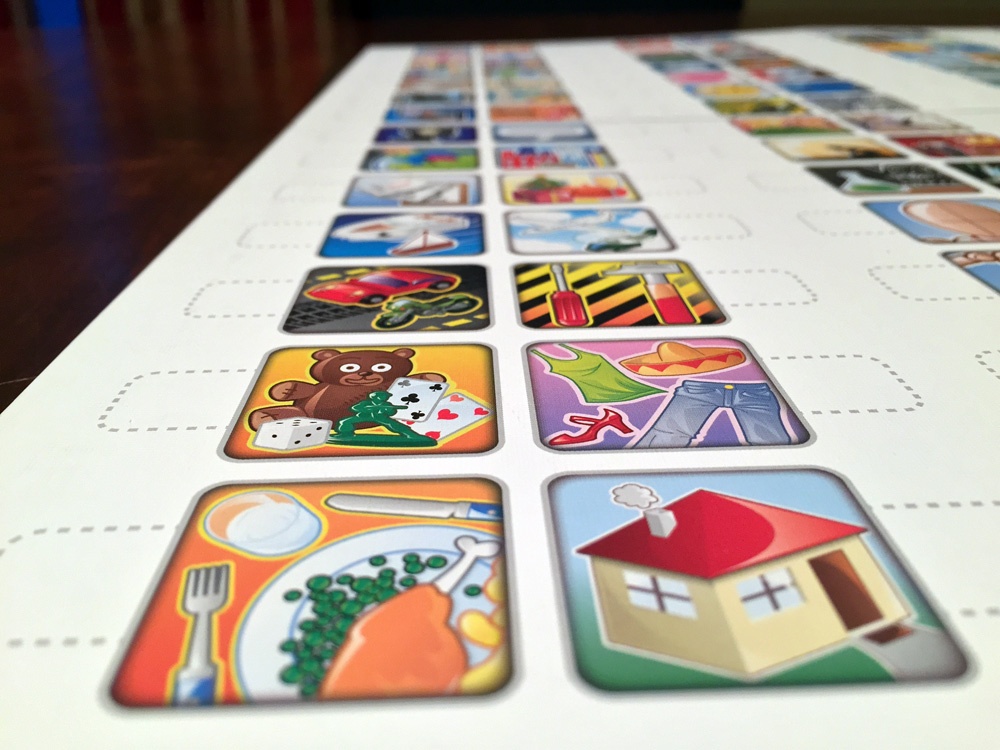
Game Experience:
Now that you know how to play Concept, I’m going to give you a free tip. Take the rule book and toss it in the trash (figuratively, not literally). The teams, the scoring, you don’t need it. In fact, the rule book even says that you probably don’t need to play with points. Trust me you don’t. Much like the game Tokaido, Concept is more about the journey then the destination.
When I first heard about Concept and my friend described it to me as Charades the board game, I immediately thought it sounded stupid and didn’t have much interest in playing it (like you’ve never jumped to a conclusion before). To be fair, Charades has such a bad rap as an incredibly lame party game, that any variation sounded equally lame.
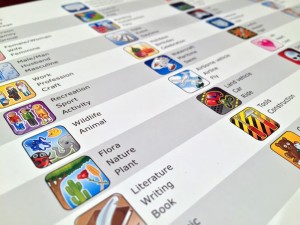
But after observing my friends playing the game for a few rounds, I slowly got sucked into it. Concept does a great job of engaging people with its really abstract nature. I think if you have a creative mind, you will love Concept. It engages that part of your brain that forces you to not only think sideways, but also jump into the mind of the person controlling the board. For clever and creative people, you will have a lot to love here.
On the other side of the coin though, if you are the kind of person that loves digging through spread sheets and being as analytical as possible, Concept could end up being an exercise in frustration. That’s because players have to get their word across with very limited options. While there are a lot of icons on the board, rarely is there everything you would want, especially for the harder words/phrases.
This frustration can also manifest itself when people get stuck after placing one or two cubes. Many times I’ve played and someone has put down what they think are the perfect clues, only to have their fellow players stare at them blankly. With Concept, you are forced to think outside of the box, but if that’s not your forte, then you might have some frustrations with this game.
Fortunately, in Concept, there is no penalty for guessing. So answers can randomly and quickly be shout out, along with the person who repeatedly guesses the same answer (you know who I’m talking about).
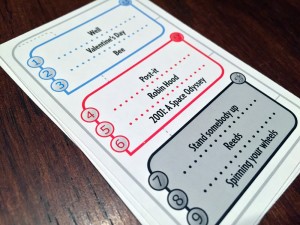
At the start, I told you to get rid of the rule book because playing with the victory point system in Concept is completely unnecessary. Someone will ask how to win, and I’ll tell them it doesn’t matter. After a few rounds, they always agree. The fun in Concept is guessing the right answer and trying to get your fellow players to do the same. It’s painfully obvious after a few rounds that no one gives a crap about whose winning. The fun in Concept is playing.
That’s also what can help it to make such a good party game. 4 people or 12 people, everyone can be just as involved each turn. There is no down time, the game keeps you entertained and it’s highly interactive.
Although when you dump out the victory points, I’ve heard Concept described as more of an activity then a game. Are they right? Maybe. Does it matter? Probably not. Concept is still fun and works well to entertain a decent size group of people. While you aren’t going to have the raunchy humor of a Cards Against Humanity, or the hilariously bad drawings from Tellestrations, I still find it to be really entertaining. Does it have it’s flaws? Sure. It can be maddeningly frustrating at times and some of the words seem really out of left field, but overall its a fairly unique experience.
Final Thoughts:
Concept was a really clever game that sucked me in despite the baseless reservations I had. For a party game, it hits all the sweet spots for me: highly interactive, no downtime, can be played with large groups, and is very easy to learn.
For those that are still cutting their teeth on Pictionary or Catchphrase, Concept is a perfect jumping off point into a more unique world of party games. For those of you that like definitive winners and losers, or games that are more black and white, then you are going to want to steer clear of this game. Concept is almost a love letter to the “right brained” people of the world who love to be creative. While Concept might not provoke the amount of laughter you might expect from a party game, its unique nature still makes it a win in my book.
Clever, creative, and fun, Concept will have a home on my gaming shelf for a while. Check this one out.
If you’d like to get a copy for yourself, you can pick one up for about $30.
Final Score: 3.5 Stars – A unique party game that in all likelihood will not have you rolling with laughter, but will still provide a good amount of fun in a very accessible game.
 Hits:
Hits:
• Very unique party game
• Easy to learn
• No down time
• Highly interactive
Misses:
• Can be frustrating at times
• Some of the words are really out there





